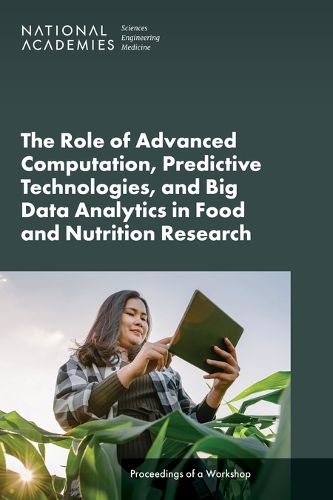Readings Newsletter
Become a Readings Member to make your shopping experience even easier.
Sign in or sign up for free!
You’re not far away from qualifying for FREE standard shipping within Australia
You’ve qualified for FREE standard shipping within Australia
The cart is loading…






Artificial intelligence (AI), machine learning (ML), and deep learning (DL) are promising tools that can be used to develop algorithms to better understand and predict interactions between food- and nutrition-related data and health outcomes. Understanding that additional research is needed to identify areas where AI/ML is likely to have an impact, the National Academies Food and Nutrition Board hosted a public workshop in October 2023 to explore the future benefits and limitations of integrating big data and AI/ML tools into nutrition research. Participants also discussed issues related to diversity, equity, inclusion, bias, and privacy and the appropriate use of evidence generated from these new methods.
Table of Contents
Front Matter 1 Introduction 2 Setting the Stage 3 Applications and Lessons Learned 4 Capacity Building 5 Potential Applications of AI to Large-Scale Food and Nutrition Initiatives 6 Final Discussion and Synthesis References Appendix A: Workshop Agenda Appendix B: Biographical Sketches of the Speakers and Moderators
$9.00 standard shipping within Australia
FREE standard shipping within Australia for orders over $100.00
Express & International shipping calculated at checkout
Artificial intelligence (AI), machine learning (ML), and deep learning (DL) are promising tools that can be used to develop algorithms to better understand and predict interactions between food- and nutrition-related data and health outcomes. Understanding that additional research is needed to identify areas where AI/ML is likely to have an impact, the National Academies Food and Nutrition Board hosted a public workshop in October 2023 to explore the future benefits and limitations of integrating big data and AI/ML tools into nutrition research. Participants also discussed issues related to diversity, equity, inclusion, bias, and privacy and the appropriate use of evidence generated from these new methods.
Table of Contents
Front Matter 1 Introduction 2 Setting the Stage 3 Applications and Lessons Learned 4 Capacity Building 5 Potential Applications of AI to Large-Scale Food and Nutrition Initiatives 6 Final Discussion and Synthesis References Appendix A: Workshop Agenda Appendix B: Biographical Sketches of the Speakers and Moderators